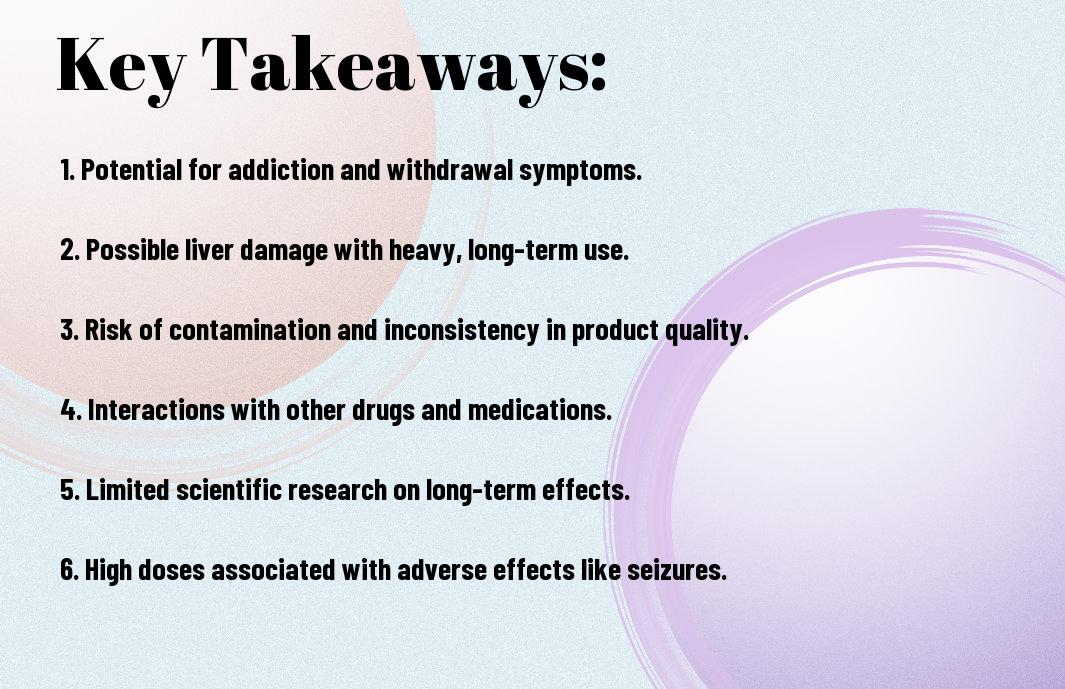There’s a growing interest in kratom, a plant hailed for its potential health benefits and criticized for its potential dangers. This controversial herb, native to Southeast Asia, is said to offer pain relief, increased energy, and even aid in addiction recovery. However, its addictive properties, potential for overdose, and risk of dependence raise concerns among health professionals. Let’s investigate deeper into the question: is kratom bad for you?

Key Takeaways:
- Kratom is a controversial substance: The debate surrounding kratom revolves around its potential benefits and risks. While some advocate for its medicinal properties in managing pain and opioid withdrawal symptoms, others express concerns about its addictive nature and potential for abuse.
- Research on kratom is limited: Despite its growing popularity, scientific studies on kratom are still scarce. This lack of research makes it difficult to definitively determine the long-term effects and safety of kratom use.
- Caution is advised: Due to the lack of regulation and inconsistent quality control in the kratom market, individuals considering kratom use should approach with caution. Consulting with healthcare professionals and being aware of potential risks is crucial in making informed decisions about kratom consumption.
In examining the complex landscape of kratom use, we are faced with a nuanced conversation that underscores the importance of balancing its potential benefits with the need for thorough research and careful consideration. As we navigate the uncertainties surrounding kratom, it becomes imperative to approach this issue with a critical eye and a willingness to engage in open dialogue.

Kratom Basics
What is Kratom?
A plant native to Southeast Asia, kratom is a tropical evergreen tree in the coffee family. Its leaves have been traditionally used for medicinal purposes in the region for centuries. Kratom contains compounds that can have psychotropic (mind-altering) effects, and is sometimes used for its stimulant and opioid-like effects.
History and Origins
Basicsbelieve it or not, kratom has a long history rooted in Southeast Asian culture. It has been utilized for its medicinal and stimulant properties in countries like Thailand, Malaysia, and Indonesia for generations. However, kratom has recently gained popularity in the Western world for its alleged therapeutic benefits.
To understand kratom better, it’s necessary to explore into its origins and how it has been traditionally consumed. The plant’s leaves are typically chewed raw or brewed into tea for their stimulating effects. In Western countries, kratom is more commonly available in the form of powders, capsules, or extracts. It is important to note that while some people advocate for kratom as a natural remedy, there are potential risks and concerns associated with its usage.
Potential Risks and Side Effects
Short-Term Effects
Now, for short-term effects, kratom can cause a range of issues including nausea, constipation, sweating, dry mouth, increased urination, loss of appetite, and itching. These side effects are typically mild and tend to fade quickly. However, in higher doses, kratom can lead to more severe symptoms such as hallucinations, delusions, and even seizures.
Long-Term Consequences
Potential long-term consequences of kratom use include dependency, addiction, and withdrawal symptoms. Users may develop a tolerance to the substance, leading them to increase their dosage over time. This can result in a cycle of reliance on kratom to feel normal, which can be challenging to break.
For some individuals, long-term kratom use has been linked to liver damage and respiratory issues, though more research is needed to fully understand these connections. It’s important to be aware of the risks associated with prolonged kratom use and to use the substance responsibly.
Interactions with Medications
Risks of kratom use can increase when combined with certain medications. Kratom has the potential to interact with opioids, benzodiazepines, and antidepressants, leading to dangerous side effects or overdose. It’s crucial to consult with a healthcare professional before using kratom if you are taking any medications to avoid these risks.
To mitigate the dangers of kratom interactions with medications, always disclose your kratom use to your healthcare provider. They can provide guidance on safe use and monitor for any adverse effects that may arise from combining kratom with other substances.
Addiction and Dependence
Keep in mind that kratom has the potential for addiction and dependence. While it may not be as potent as other opioids, it still activates the brain’s opioid receptors, leading to potential addictive behavior. People who misuse kratom may develop a tolerance to its effects, leading them to consume higher doses to achieve the desired results.
Signs of Addiction
On the road to addiction, individuals may exhibit signs such as craving kratom, spending a significant amount of time obtaining or using it, neglecting responsibilities, and experiencing withdrawal symptoms when they try to stop using it.
Withdrawal Symptoms
With prolonged, heavy kratom use, individuals may experience withdrawal symptoms when they reduce or stop using the substance. These symptoms can include anxiety, irritability, muscle aches, insomnia, and mood swings. It’s important to note that the severity of withdrawal symptoms can vary depending on the individual and the extent of kratom use.
To address kratom dependence and addiction, several treatment options are available.
Treatment Options
Options for treating kratom addiction and dependence include therapy, support groups, and medication-assisted treatment. Therapy can help individuals understand the root causes of their addiction and develop coping strategies. Support groups provide a sense of community and empathy, while medication-assisted treatment may be used to manage withdrawal symptoms and cravings.
Treatment for kratom addiction should be tailored to the individual’s needs and may require a combination of these approaches. It’s vital to seek help from healthcare professionals and addiction specialists to address kratom addiction effectively.
Physical Health Concerns
Liver Damage and Toxicity
To address the question “Is kratom bad for you?” an important aspect to consider is the potential for liver damage and toxicity associated with kratom use. Some studies have linked kratom consumption to liver injury, with symptoms including jaundice, dark urine, fatigue, and abdominal pain. While cases of severe liver damage from kratom are rare, it is imperative to be aware of the risks involved in using this herbal supplement.
Cardiovascular Issues
Liver health is not the only concern when it comes to kratom usage; cardiovascular issues have also been reported in some users. Kratom has been known to cause an increase in blood pressure and heart rate, which can be problematic for individuals with preexisting cardiovascular conditions. It is crucial to monitor these vital signs when using kratom and consult with a healthcare professional if any adverse effects are experienced.
Furthermore, cardiovascular complications such as palpitations and chest discomfort have been associated with kratom use. These effects can be exacerbated when kratom is used in combination with other substances, highlighting the importance of understanding the potential risks involved in consuming this herbal supplement.
Respiratory Problems
To probe deeper into the physical health concerns surrounding kratom use, health experts have also raised alarms about potential respiratory problems associated with kratom consumption. Chronic kratom use has been linked to respiratory depression, which can be dangerous and even life-threatening. This risk is particularly relevant for individuals with respiratory conditions or those who misuse kratom by taking excessively high doses.
Respiratory issues such as difficulty breathing and lung irritation have been reported in some kratom users, underscoring the need for caution when using this herbal supplement. It is imperative to be aware of the potential respiratory effects of kratom and prioritize respiratory health when considering its use.
Note: This content is provided for informational purposes only and does not constitute medical advice. If you have concerns about kratom use, consult a healthcare professional.
Mental Health Implications
Anxiety and Depression
Your mental well-being can be significantly impacted by the use of kratom. Many users report experiencing increased anxiety and even symptoms of depression after prolonged consumption of this botanical substance. The effects of kratom on your brain’s neurotransmitters can exacerbate existing mental health conditions or trigger new ones.
Psychotic Episodes
Anxiety can escalate into more severe mental health issues, such as psychotic episodes, in some kratom users. These episodes can include hallucinations, delusions, and paranoia, posing a serious risk to both the individual experiencing them and those around them.
It is crucial to understand that not everyone who consumes kratom will experience psychotic episodes. However, the risk is significant enough to warrant caution, especially for individuals with a history of mental health disorders.
Suicidal Thoughts
With the misuse of kratom, individuals may experience heightened suicidal thoughts. The altered brain chemistry and increased impulsivity associated with kratom use can contribute to these dangerous ideations. If you or someone you know is experiencing suicidal thoughts, seek help immediately.
Another potential consequence of kratom use is the masking of underlying mental health issues, which can lead to a delay in seeking proper treatment. It is vital to address mental health concerns with the guidance of healthcare professionals to prevent the worsening of symptoms.
Legal and Social Considerations
Legal Status and Regulations
The Kratom: Unsafe and ineffective article highlights concerns about the safety and efficacy of kratom. The legality of kratom varies from country to country and state to state. In the United States, kratom is legal in some states, restricted in others, and entirely banned in a few. The U.S. Drug Enforcement Administration (DEA) has raised concerns about kratom’s potential for abuse and dependence, leading to its classification as a Schedule I controlled substance in some states.
Social Stigma and Acceptance
Status
Stigma
Workplace and School Implications
Social
Legal
Is Kratom Legal in Canada and is it Safe to Consume?
Yes, kratom legality in Canada is a bit of a gray area. Currently, it is not classified as a controlled substance, but it is not approved for human consumption by Health Canada. As for safety, it’s important to find a reputable source and use it cautiously, as with any herbal supplement.
Is Kratom High Safe for Consumption and Long-term Health?
Kratom high effects have raised concerns about its safety and long-term health impact. While some claim it is safe for consumption, evidence is limited. Potential side effects include nausea, sweating, and increased heart rate. Long-term use may lead to addiction and withdrawal symptoms. Further research is needed to understand its potential risks.
Conclusion
Following this examination of the potential risks and benefits of kratom, it is clear that the substance can have both positive and negative effects on an individual’s health. While some people may find relief from chronic pain or substance withdrawal symptoms using kratom, the substance also carries the risk of addiction, overdose, and other adverse effects.
Ultimately, the decision to use kratom should be made with caution and careful consideration of the potential consequences. Consulting with a healthcare professional before starting to use kratom is highly recommended to ensure that it is done in a safe and responsible manner.
FAQ
Q: What is kratom?
A: Kratom is a tropical tree native to Southeast Asia, known for its leaves that have psychotropic effects when consumed.
Q: How is kratom typically consumed?
A: Kratom leaves are often brewed into tea or chewed raw, but in the Western world, it is more commonly available in the form of capsules, tablets, or concentrated extracts.
Q: Is kratom addictive?
A: Kratom contains compounds that can activate opioid receptors in the brain, leading to potential addictive effects with long-term and high-dose use.
Q: Are there any health risks associated with kratom use?
A: Some potential risks of kratom use include increased heart rate, nausea, constipation, seizures, liver damage, and in severe cases, hallucinations and psychosis.
Q: Is kratom legal and regulated?
A: The legal status of kratom varies by country and region, with some places banning its sale and use due to safety concerns and lack of regulation in production and distribution.






